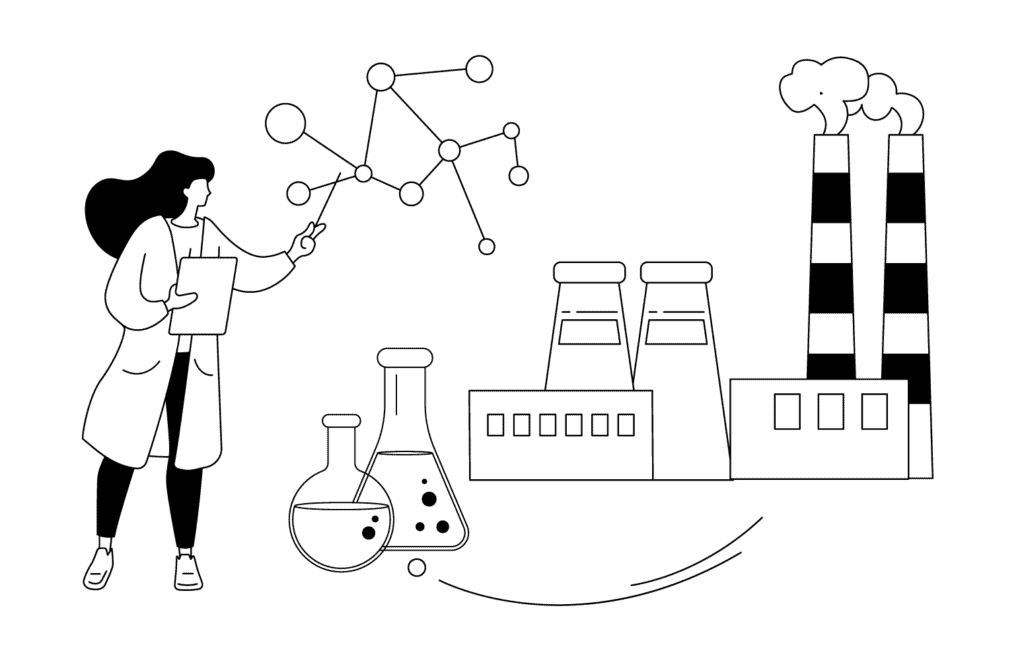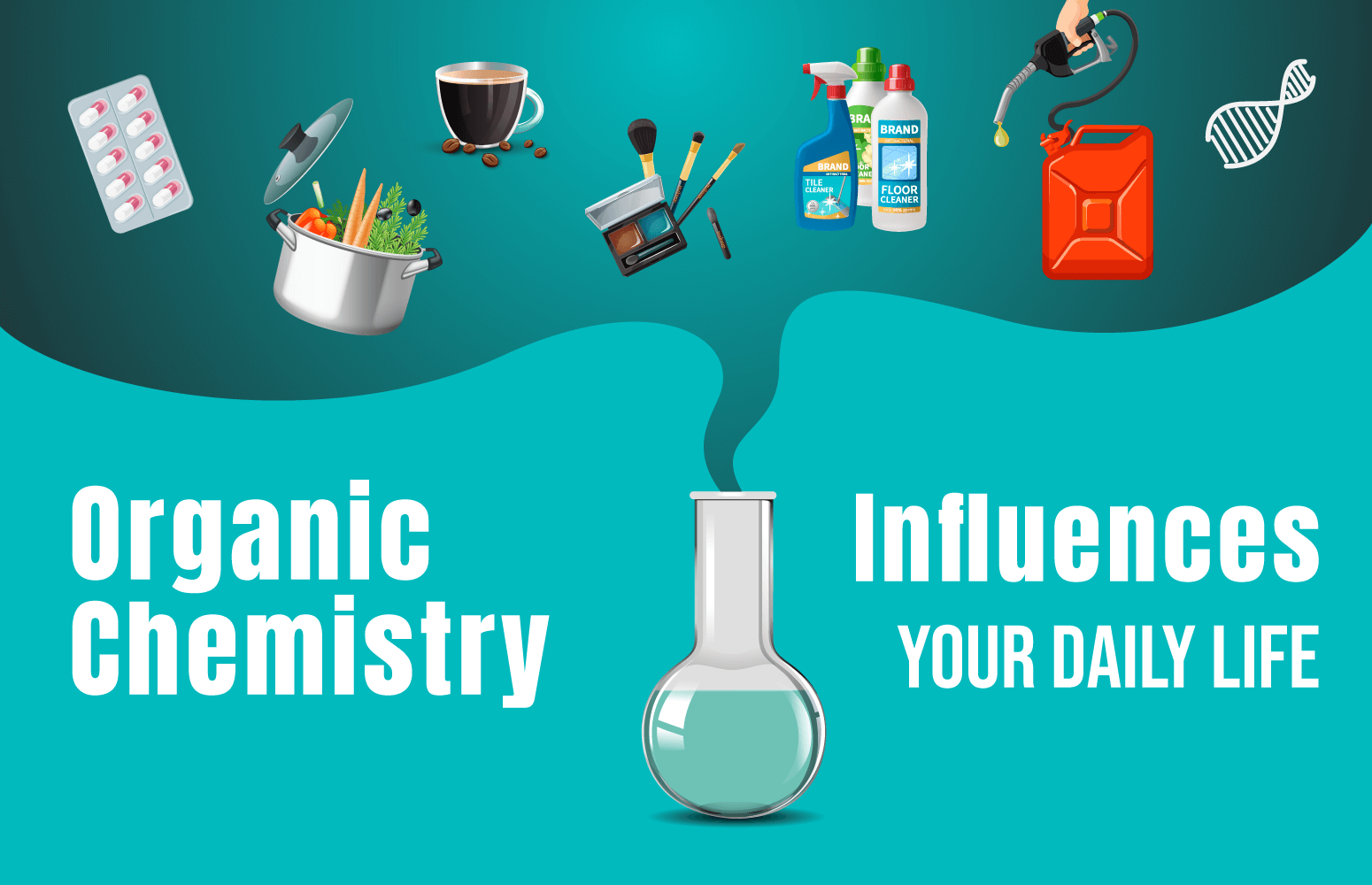You’re about to embark on a fascinating journey that intertwines the complexities of organic chemistry with the simplicity of your daily life. You might be wondering, “What on earth is organic chemistry?”
Put simply, organic chemistry is the study of carbon-containing compounds and their reactions. But don’t be fooled by its seemingly narrow definition. Were you aware that the carbon atom is the backbone of life? That’s right, the very foundation of life as we know it hinges on this tiny atom and its many compounds.
In the realm of science, organic chemistry holds a unique position. It is a discipline that merges the precise, analytical nature of chemistry with the complexity and unpredictability of biology. This explosive combination gives birth to a plethora of compounds, reactions, and phenomena that shape our world in ways we often overlook.
You might be thinking, “Okay, so it’s important. But how does it affect me?” Well, let’s dive into the world of organic chemistry and see how it intertwines with your everyday life.
Understanding Organic Molecules
Organic molecules are integral to life on Earth. They are the building blocks that form the structures and mechanisms of living organisms. Organic molecules include carbohydrates, proteins, lipids, and nucleic acids. Each of these molecules plays a specific role in your body. Carbohydrates provide energy, proteins build and repair tissues, lipids store energy and form cell membranes, and nucleic acids carry genetic information.
But these organic molecules aren’t just inside you; they’re all around you, too! They’re in the food you eat, the air you breathe, the clothes you wear, and even in the screen you’re reading this on. These molecules are so pervasive that it’s hard to imagine a world without them.
The beauty of organic chemistry lies in its diversity. With just one carbon atom, the possibilities are endless. Carbon atoms can link together to form chains, rings, and more complex structures. And when other elements like hydrogen, oxygen, nitrogen, and phosphorus join the party, the variety of organic molecules that can be formed is mind-boggling.
10 Organic Chemistry Examples in Daily Life
Now that you have a basic understanding of organic chemistry, let’s explore some examples of how it permeates your daily life.
1. Food Preparation and Cooking: The process of cooking food involves numerous chemical reactions that are studied in organic chemistry. For instance, Maillard’s reaction in cooking, where sugars and proteins react under heat to produce a variety of flavors, is an example of organic chemistry.
2. Caffeine: The stimulating effect of caffeine, found in coffee and energy drinks, is also due to organic chemistry. Caffeine is an alkaloid compound composed of nitrogen and carbon atoms. It works as a stimulant by blocking the adenosine receptors in the brain, which helps to keep us alert and awake.
3. Medicine: Many of the drugs and medicines we consume are organic compounds. Aspirin, for instance, is an organic compound synthesized from salicylic acid. The design and synthesis of drugs involve a deep understanding of organic chemistry.
4. Cosmetics: The makeup, lotions, and other beauty products used daily contain a variety of organic compounds. For example, lipsticks often contain waxes, oils, and pigments, all of which are organic.
5. Cleaning Products: Many of the cleaning products used in homes, such as detergents and soap, are produced from organic compounds. For example, soaps are sodium or potassium salts of fatty acids, produced by the reaction of fats with a strong base in a process called saponification.
6. Plastics and Polymers: Most of the plastics and polymers used in our daily life, from plastic bags to computer parts, are made from organic compounds. Polyethylene, for instance, is a polymer made from the organic compound ethylene.
7. Fuel: The gasoline or diesel fuel that powers vehicles is a mixture of organic compounds, called hydrocarbons. The combustion of these fuels is a chemical reaction studied in organic chemistry.
8. Fermentation: The process of fermentation, which is used to produce alcoholic beverages and products like yogurt, is an organic chemical process. The conversion of sugars into alcohol by yeast is an example of this.
9. Photosynthesis: The process by which plants convert sunlight into energy, is also an example of organic chemistry. In photosynthesis, carbon dioxide and water are converted into glucose and oxygen.
10. DNA: The structure and function of DNA, the genetic material of all living organisms, is also governed by principles of organic chemistry. The DNA molecule is composed of nucleotides, which are organic compounds.
Organic Chemistry Use Case: A Closer Look

Let’s zoom in on one specific use case to illustrate the impact of organic chemistry on our lives: plastics. Plastics are made from polymers, large molecules formed by linking many smaller units called monomers. Many of these polymers are organic compounds, derived from petroleum or natural gas.
According to NRDC, an estimated 300 million tons of plastic are produced every year worldwide. The World Economic Forum notes that this vast production meets the demand for a multitude of applications, with packaging being a dominant sector, accounting for around 40% of the total use. From the bottle that holds your water to the keyboard you’re typing on, plastics have a presence in virtually every aspect of our modern lives. The American Chemistry Council highlights their advantages: Plastics typically weigh about 50% less than equivalent materials like glass.
Additionally, their durability makes them ideal for various applications. From the bottle that holds your water to the keyboard you’re typing on, plastics are an integral part of our lives. They’re lightweight, durable, and can be molded into almost any shape, making them incredibly versatile.
But they also pose significant environmental challenges, which brings us to our next point.
The Influence of Organic Chemistry in the Environment
Organic chemistry is not just about the compounds that benefit us; it’s also about the ones that harm our environment. Plastic pollution is a prime example.
A study published in Science by Jambeck et al. in 2015 found that an estimated 8 million metric tons of plastic end up in our oceans every year. Another study from Geyer, Jambeck & Law in Science Advances in 2017 pointed out a concerning fact: only about 9% of all plastic ever produced has been recycled. The remainder finds its way to landfills, incineration, or directly impacts the environment.
Plastics take hundreds of years to decompose, and during this time, they can release harmful organic compounds into the environment. These compounds can contaminate water sources, harm wildlife, and even enter our food chain.
Fossil fuels, another product of organic chemistry, are also a major contributor to climate change. The burning of these fuels releases carbon dioxide, an organic compound, into the atmosphere, leading to global warming.
However, it’s not all doom and gloom. Organic chemistry also provides solutions to these problems. From developing biodegradable plastics to creating renewable fuels, organic chemistry is at the forefront of sustainable innovation.
Conclusion: Organic Chemistry’s Unseen Influence on our Daily Life
So there you have it. From the coffee you drink to the air you breathe, organic chemistry is a constant presence in your life. It’s in the drugs that cure diseases, the plastics that make our lives convenient, and even in the challenges that threaten our environment.
Organic chemistry is not just a subject taught in schools. It’s a vital thread in the tapestry of life, weaving its way through every aspect of our existence. So, the next time you sip your coffee, wash your hands or simply breathe, remember the unseen influence of organic chemistry.
And with that, we come to the end of our journey. We’ve only scratched the surface of organic chemistry’s impact on your daily life, but hopefully, this has sparked your curiosity. So keep exploring, keep questioning, and remember that science is not just in textbooks, it’s all around you.

